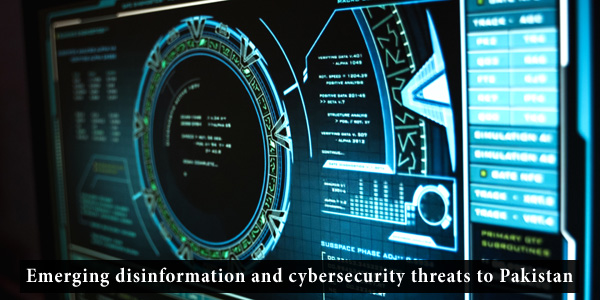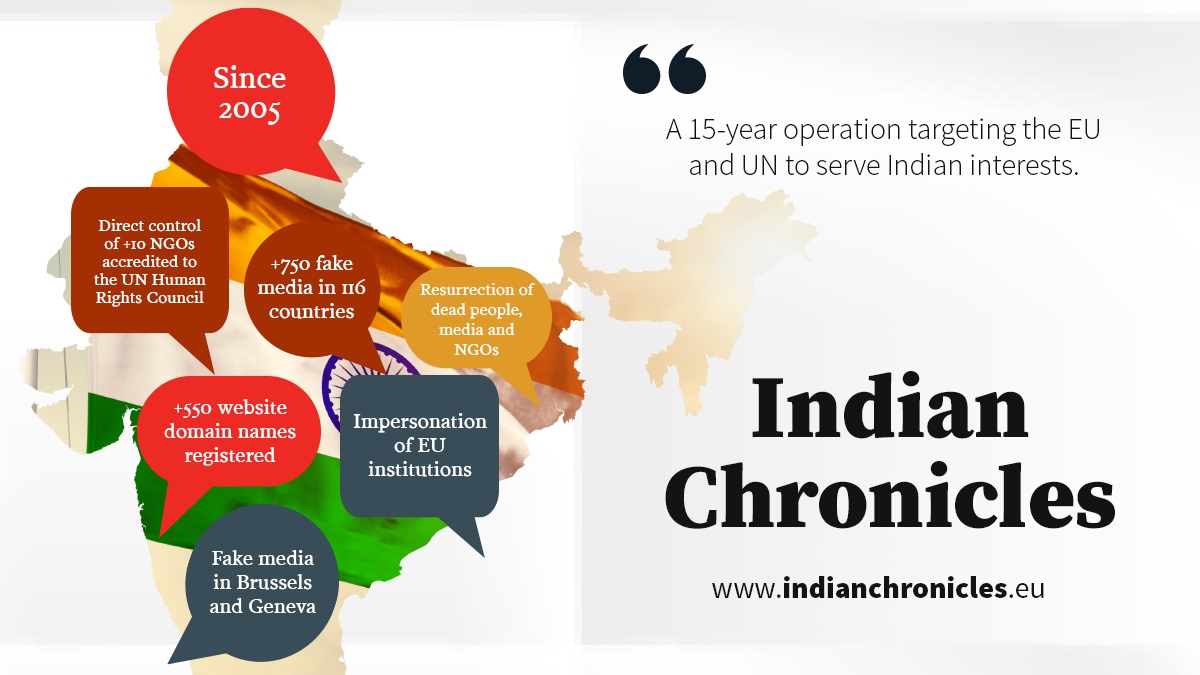Emerging disinformation and cybersecurity threats to Pakistan
Pakistan must step up efforts to counter disinformation and fake newsBy Akhtar Jamal - March 28, 2022

Cyberattacks paired with fake news and disinformation campaigns pose a serious threat to the country’s national security, institutions, and people. Pakistan currently lacks a comprehensive framework and countermeasures that effectively address cybersecurity threats.
The absence of a proper mechanism to deal with cyber threats allows foreign interference (attempts to covertly influence a country’s democratic process, elections, manipulation) against individuals, organizations, and government by local or foreign actors. Such interference can endanger the security and stability of a country.
Pakistani cyber experts believe that foreign adversaries and malicious actors have leveraged disinformation campaigns to create and amplify social divisions and continue dirty tactics and activities in Pakistan without fear of check or accountability.
“Close monitoring of the enemy’s designs revealed that malicious foreign agencies continue to manipulate information and interfere in Pakistan to disrupt its unity and provincial harmony by creating fake misunderstanding between different pillars of power,” according to a senior Pakistani official.
A cybersecurity expert claims that in recent years, foreign state-backed hackers “managed to create artificial differences among politicians and polarization in the public,” to destabilize the governance system and distort public discourse. “At least one foreign intelligence not only carried out cyberattacks but also recruited social media activists to advance their agenda,” according to a local expert.
 Digital background depicting innovative technologies in security systems. (Image Credit: istock)
Digital background depicting innovative technologies in security systems. (Image Credit: istock)
Pakistan facing cyberattacks
Pakistan’s state institutions and citizens are overwhelmingly unaware of the severity of foreign interference, the spread of disinformation, and massive manipulation by both internal and external factors, cybersecurity professionals say.
“Cyberspace is a rich and fertile ground to invoke social unrest in target countries by using information warfare techniques,” says Pakistani cybersecurity expert and researcher, Rafay Baloch. “Being a nuclear state and the producer of advance missile technology makes Pakistan a potential target for cyberattacks, not just designed to steal information, but also to sabotage its national assets, such as nuclear reactors, power plants, grid stations, airports, telecom hubs” and can also undermine economic stability and even disrupt healthcare, energy, aviation, and other facilities.
In recent months, the National Bank of Pakistan and the Federal Board of Revenue have suffered cyberattacks. Pakistani Minister Shaukat Tarin said that FBR portals were subjected to 71,000 cyberattacks every month on average.
Experts say that few Pakistanis are aware that enemies have begun using the information as a “weapon to spread confusion and chaos” in the country. In recent months, India-based cyber experts and social media activists have launched “disinformation campaigns of an unparalleled malice and magnitude” to malign state institutions in Pakistan and undermine the country’s position and influence globally.
 EU DisinfoLab uncovered a massive operation “Indian Chronicles” targeting international institutions and serving Indian interests. (Image Credit: Disinfo.eu)
EU DisinfoLab uncovered a massive operation “Indian Chronicles” targeting international institutions and serving Indian interests. (Image Credit: Disinfo.eu)
In December 2020, a European organization EU DisinfoLab uncovered a massive disinformation campaign covertly run by India primarily to malign Pakistan and target the EU and the United Nations to serve Indian interests. The Indian network was found active in Brussels and Geneva producing and amplifying content to undermine Pakistan.
5th Generation Warfare
Fifth-generation warfare (5GW) is a term widely used but hardly understood in Pakistan. Explaining the phenomenon, Haroon Ali, Director Cybersecurity of Australian Cyber Corporation, told IRIA that “Disinformation or malinformation, which is easy to produce, is a common and sometimes powerful 5GW tool sponsored by adversary governments. 5GW is a non-military action campaign against a state involving cyberattacks, disinformation, social engineering, and artificial intelligence.”
The top Twitter hashtag named #CivilWarInPakistan in April 2021 in which various old and unrelated videos were used “to suggest a war-like situation in Pakistan is a perfect example of 5GW against a state” he says. “This attempt to sow anarchy, purportedly sponsored by the Indian government based on the investigation findings, failed to produce intended results because the public’s reflex kicked in to verify authenticity. This is the kind of reflex which we need for every disinformation post out there.”
 Image Credit: Tima Miroshnichen
Image Credit: Tima Miroshnichen
Raising public awareness is critical
Several experts claim that Pakistan’s free and vibrant electronic media and rising activists on social media are often misled by external elements without realizing who initiated the fake news. The experts are urging the government to involve civil society organizations in raising public awareness to unmask the covert agenda of external and external enemies of Pakistan.
More recently, free media campaigners in the European Union (EU) have suggested revoking the licenses of organizations distributing foreign state propaganda and forcing social media platforms that serve as vehicles for foreign interference to prevent inauthentic accounts that drive the spread of harmful external interference. After the Russia-Ukraine crisis, several Western parliamentarians are suggesting a ban on political parties linked with foreign countries or institutions. Some European parliamentarians have proposed a ban on foreign funding and restricting ‘foreign actors’ to recruit former politicians even after their retirement.
Countering disinformation
How can Pakistan be better prepared to counter disinformation campaigns Cybersecurity expert Haroon Ali says “while there is no silver bullet to stop fake news, disinformation or deep fakes, enforced regulations” there are certain measures the government can employ such as:
• Artificial intelligence-based tools, employed by social media companies that identify fake news;
• Incentivizing the general public into reporting fake news with evidence;
• Creating free multilingual awareness training on large platforms like YouTube, Udemy, and Pluralsight about how to be correctly skeptical of everything we watch and read.
Ali suggested that another proactive measure that the government can adopt is the “establishment of a Pakistan centric web-based platform and mobile apps, where all news articles and social media reports concerning Pakistan are verified as authentic or disinformation and maintained in a permanent database like the MITRE ATT&CK framework in cybersecurity world containing a curated knowledge base and adversary behavior model against the targeted audience.”
Pakistan has recently approved the National Cybersecurity Policy 2021 which envisions a broader policy focusing on securing assets, creating a robust digital ecosystem, and ensuring the security of state institutions as well as public organizations.
 Cybersecurity and secure nerwork concept. (Image Credit: istock)
Cybersecurity and secure nerwork concept. (Image Credit: istock)
Some experts have also suggested Pakistan government to study and implement a framework similar to Estonia’s Defense League (EDL or Kaitseliit) to build a homegrown system and create a unit composed of certified and skilled cybersecurity professionals to respond to potential cyberattacks that threaten the country’s critical infrastructures. Some of the suggestions include:
1. A voluntary force of cybersecurity experts to contribute to national defense on flexible terms aimed at protecting Pakistan’s cyberspace. This will help build a highly skilled and specialized reserve force of cyber experts.
2. Recruit and retain young people to strengthen the cyber workforce dedicated to countering threats.
3. A special unit that will coordinate cybersecurity efforts across government, military, and public organizations under one institution such as National Centre for Cyber Security.
4. Focus on cyber defense, training, exercising (cyberattack simulation), educating the public about emerging cyber threats, leading the fight against fake news and disinformation, and countering harmful narratives.

















